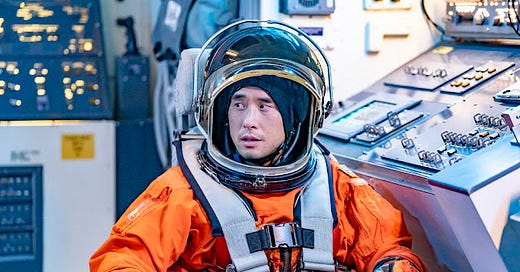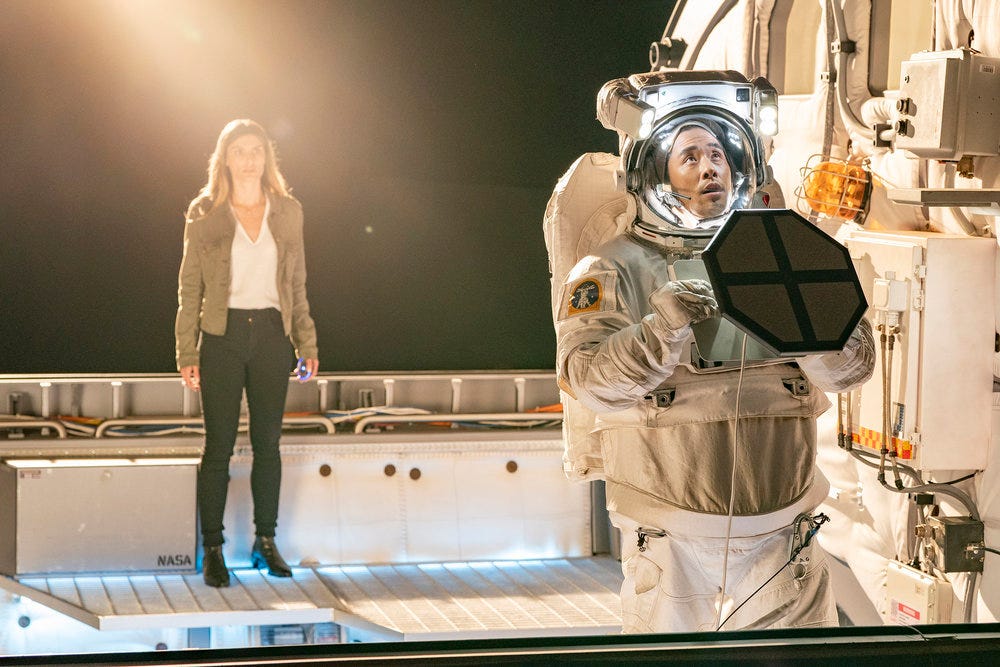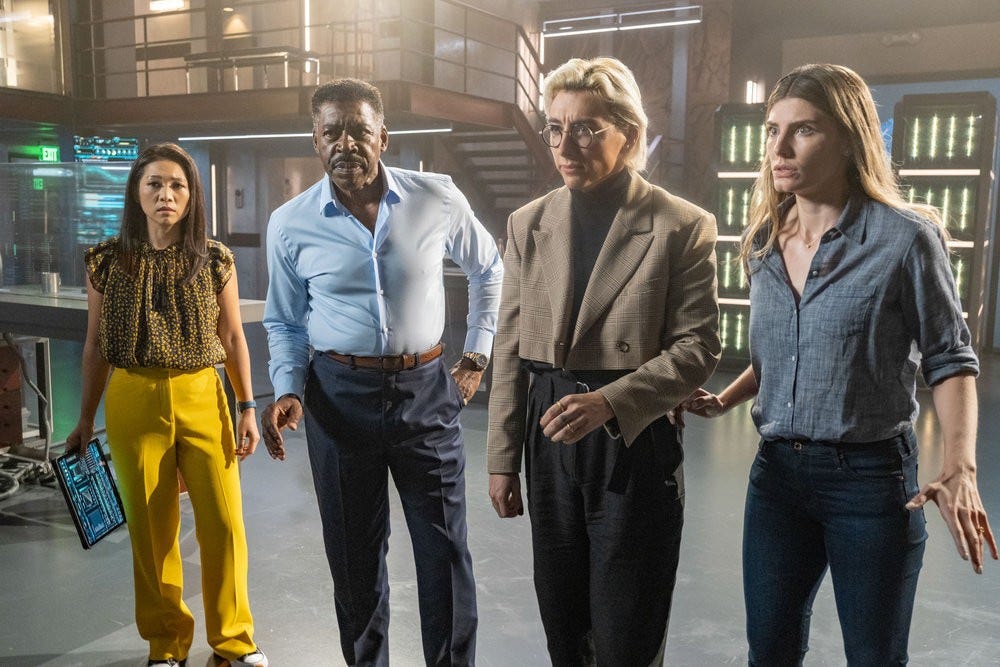Quantum Leap (2022) - Episode 1x02 - Atlantis - Review
In its second episode, Quantum Leap tells a more interesting story of the week, but remains bogged down by its connection to the original series.
As I mentioned in my review of House of the Dragon 1x06, I recently had the opportunity to co-write a review of the 2022 Quantum Leap "Legacyquel" with Myles McNutt over on his Susbtack, Episodic Medium. Please consider subscribing to Myles’ blog: Episodic Dialogue: Fall Pilots 2022 - NBC's Quantum Leap.
Quantum Leap (2022) tells the story of Dr. Ben Song, whose use of an experimental time machine for mysterious purposes has trapped him in the past in someone else's body. Addison, his only tether to the present, as well as his fiancée—who he does not remember thanks to plot time-travel-induced amnesia—appears to him as a hologram that only he can see. Each episode, Ben 'leaps' into a different life to "put right what once went wrong" in the hopes that the "next leap will be the leap home."
This concept provides a fantastic procedural engine—the show can become anything it wants as the protagonist leaps from life to life, era to era, and genre to genre; from a high-octane 80s heist to a time-limited 90s survival scenario in space, and beyond!
I loved the original Quantum Leap as a kid (which I watched in reruns in the early 00s), especially for its then progressive lessons about empathy. However, much of it does not hold up. In hindsight, two white guys saving the day by leaping into different people can come across as, at best, clunky. Casting the Leaper as a Korean-American—and adding romantic amnesiac tension—does at least create depth for the series to unpack. In the hands of the right showrunners, this sequel has the opportunity to engage with more modern and sensitive approaches to questions of identity.
In the review linked above, we explored what it means for a show to be burdened by its legacy. Why make a sequel, and not a reboot, without the original cast or a clear promise of resolving loose threads (e.g., the fate of the OG Leaper, Dr. Sam Beckett)?
So, with all that in mind, I thought it would be fun to review the show week-to-week, ahead of checking back in with Myles midseason. To keep the discussion light, I plan to divide these reviews into three sections reflecting the procedural and serialized challenges of making a 'legacyquel.'
Procedural Storytelling: Does the case of the week work; are the genre, era, and characters compelling? How do the procedural elements hold up?
Serial Developments: What are we learning about Ben and Addison’s relationship; do the characters in the present and their connections work? What about the mysteries at the heart of the show (like Ben's decision to leap)?
Legacyquel Baggage: How is the mythology of the original series addressed? Does it seem like it was the right call, making a sequel rather than a reboot?
Procedural Storytelling: For All Mankind
There are lots of ways a case of the week can be done effectively in the context of this show: a small, intimate story about characters who matter to us, or maybe smaller stories reflecting broader social issues. Both cases so far have been oddly ‘large’ and lacking in the heart or commentary I want. A museum heist with a dash of domestic terror plus a potentially fatal 1998 spaceflight seem like oddly high-stakes stories to launch the series. More than that, they’re the kinds of historically-tinged events we can look up and see did not happen. No heist! No 1998 Atlantis mission! No astronaut named David Tamura dying on a spacewalk! We’ll see how this works out long-term.
Overall, Atlantis had a far more compelling case of the week compared to the pilot. It helped that we already understood the premise and that more time could be spent directly in the past, even if I do wish that I had a better feel for this as being set in the 90s. Regardless, the characters were fun and their team dynamic worked really well for me. It was nice how it also enabled Addison to trust Ben, implicitly, with his motivations being (perhaps understandably) questioned by the rest of the team.
One area that I find interesting is the choice to start the pilot with Ben leaping into a fairly generic bearded white dude, and then leaping into an Asian American here (who, as Ben slowly remembers, inspired him as a young Korean immigrant to the US). There’s a lot of room for the show to build toward something more complex and, for now, I am willing to trust that the showrunners have something interesting to say.
Serial Developments: Trust Ben, I Guess, He Is Nice
Ben and Addison’s connection, tension, and banter remain the best and most charming part of Quantum Leap. I would be happy spending all of my time with them, especially since I have little investment in the rest of the regulars. Mason Alexander Park is easily the most fun, and I do like Ernie Hudson, but the show feels like it’s being pulled in too many directions: 1) the case of the week; 2) Ben & Addison; 3) the rest of the team; 4) and the larger mythos all compete for time and our attention.
Atlantis’ B Plot had to do with Addison making decisions about who to trust more: Ben or The Team. In the end, she chooses Option C: Everyone! Hurray! Kind of heartwarming with a sprinkling of deus ex machina, but nothing super exciting (yet).
Legacyquel Baggage: Everything’s Coming Up Calavicci
In the present, we get our first official cameo (outside of photos) from the original series: Beth (played here by the same actress, Susan Diol), the first wife of Al Calavicci (the original hologram).1 His daughter, Janice Calavicci, appears to have been roped into helping Ben do whatever it is Ben is doing. Not much happens here except something something Janice escapes, something something hard drives.
One area of offscreen baggage that has frustrated me is the concept of the “Waiting Room.” In the original series, when Sam leaps into someone, their displaced consciousness transfers into his body in the present. Like Sam, they also have memory loss, but they could provide helpful context and information that the historical record (used by Ziggy, their AI, to sort out what Sam has to “put right”) may not include.
That the 2022 series spends so much time in the present with a larger cast of series regulars is potentially to the detriment of the time we could spend in the past with the case of the week. And yet, if the show had not simply forgotten about the Waiting Room, there could have been an interesting opportunity to really connect the case of the week to serial developments. More time in the present should, in theory, mean more time fleshing out the leapeee. It's such an easy win here, but it looks like the present is more about the mythology than the case. It's feels a bit weird for me to root for the procedural elements of the show over longterm serialization, but Quantum Leap offers such a strong set of procedural options; I just don't want them to drop the ball on what could be really effective emotional connections.
An additional effect of the Waiting Room retcon is my confusion about Magic's role in the story. Herbert "Magic" Williams appears in the original series. However, we never actually get the chance to know him, as he was someone Same leaped into. We only knew him through Sam and through how others reacted to him. Why not let his experience in the Waiting Room help build character AND connect the two series together? Hopefully they just lost track of the waiting room for two episodes? Maybe?
Quantum Leap struggles to juggle its many different balls, but episode 2 was enough of an improvement over the pilot to leave me hopeful. Let me know your thoughts in the comments!
Dean Stockwell, who played Al, sadly passed away in 2021 at the age of 85. A part of me wonders if his death played any role in Scott Bakula (aka Sam Beckett) choosing not to participate in the series. Or into how strange a choice it was to make a sequel series.







